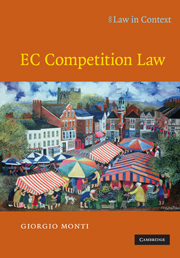Book contents
- Frontmatter
- Contents
- Preface
- Table of cases
- Table of legislation
- 1 Competition law: policy perspectives
- 2 The core values of EC competition law in flux
- 3 Economics and competition law
- 4 Competition law and public policy
- 5 Market power
- 6 Abuse of a dominant position: anticompetitive exclusion
- 7 Abuse of a dominant position: from competition policy to sector-specific regulation
- 8 Merger policy
- 9 Oligopoly markets
- 10 Distribution agreements
- 11 Institutions: who enforces competition law?
- 12 Competition law and liberalisation
- 13 Conclusions
- Index
13 - Conclusions
Published online by Cambridge University Press: 05 June 2012
- Frontmatter
- Contents
- Preface
- Table of cases
- Table of legislation
- 1 Competition law: policy perspectives
- 2 The core values of EC competition law in flux
- 3 Economics and competition law
- 4 Competition law and public policy
- 5 Market power
- 6 Abuse of a dominant position: anticompetitive exclusion
- 7 Abuse of a dominant position: from competition policy to sector-specific regulation
- 8 Merger policy
- 9 Oligopoly markets
- 10 Distribution agreements
- 11 Institutions: who enforces competition law?
- 12 Competition law and liberalisation
- 13 Conclusions
- Index
Summary
At the beginning of the book, I suggested that the study of competition law could be enriched by trying to do more than decode ambiguous Treaty Articles and Regulations, increasing volumes of soft law notices, and Delphic judgments. In addition, one should inquire about the forces that agitate the development of the law. For convenience, these forces were distilled into the trio of institutions, economics and politics. We take these in turn one final time to wrap up our inquiry and bring together the major themes which have been discussed in the preceding chapters.
Institutions
The Commission has been at the centre of law enforcement since Regulation 17/62 came into force. It has deployed three methods to enforce law: adjudication, legislation and soft law. In the early days it relied exclusively on decisions to proscribe certain forms of conduct, while since the late 1970s and increasingly in the 1980s, it used legislative powers to draw up block exemptions to steer firms, and since the mid-1990s and in particular since 2004, it has relied on soft law notices. For firms this development may provide a greater degree of legal certainty, allowing them to plan in advance. However, it also removes the courts from the legal process, leaving the Commission free to establish, and alter, the rules of competition as its enforcement priorities shift.
- Type
- Chapter
- Information
- EC Competition Law , pp. 497 - 505Publisher: Cambridge University PressPrint publication year: 2007



